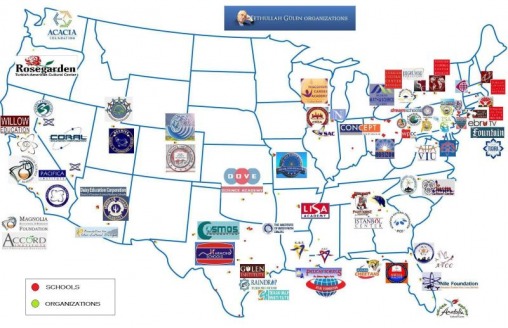NASHVILLE, Tenn. -- A conservative group that has warned of the growing influence of Islam is promoting a bill that would limit how many legal immigrants charter schools can hire, drawing opposition from charter school and immigrant groups.
The Tennessee Eagle Forum, an organization that has criticized U.S. immigration policy and last year pushed for passage of the so-called “Shariah bill,” is pressing Tennessee lawmakers to pass legislation that would cap the number of foreign workers charter schools can hire.
The bill has drawn bipartisan support but has raised the concerns of charter school advocacy and immigrant rights organizations, which say it would place unfair and unnecessary limits on who can be hired or volunteer with charter schools.
The Putting Tennessee First Act, which is scheduled to be heard in two committees this week, makes no reference to religion. But it comes amid worries from some groups about the involvement of Islamic organizations in running charter schools elsewhere in the country, although there are no such schools in Tennessee.
The measure, Senate Bill 3345, says chartering authorities may not approve schools that plan to have more than 3.5 percent of their staff made up of legal immigrants with visa work permits. The bill also calls on authorities to revoke schools’ charters later if they exceed the cap, and it requires schools to disclose the source of all donations from overseas.
There is no record of any schools in Tennessee exceeding that limit, in part because records aren’t maintained on employees’ nationality.
The Tennessee Eagle Forum, which drafted the bill, is affiliated with the Eagle Forum, a national organization that wants to reduce the number of visas available to foreign-born workers and opposes the use of textbooks that it sees as favorable to Islam.
Last year, the Tennessee Eagle Forum urged lawmakers to pass the Material Support to Designated Entities Act, which would have declared some followers of Shariah to be terrorists. Muslim groups vigorously opposed the bill, arguing that Shariah covers a broad set of Islamic traditions, many of which have nothing to do with warfare or secular law.
Legislators later stripped out references to religion.
Like the Material Support to Designated Entities Act, this latest bill is sponsored by House Speaker Pro Tempore Judd Matheny, R-Tullahoma, and Senate Republican Caucus Chairman Bill Ketron, R-Murfreesboro.
Supporters say the measure is meant to encourage the hiring of Tennessee and American-born teachers by charter schools.
“The state of Tennessee is stating a preference that charter schools look to hire U.S. and Tennessee workers as a priority,” said Joanne Bregman, an attorney for the Tennessee Eagle Forum.
But charter school advocates fear the bill’s broad provisions could limit the ability of schools to hire the best instructors. Immigrant groups, meanwhile, fear it could limit participation in charter schools by people living in immigrant communities.
“The intent of this bill is really to put up barriers for anyone with a foreign background to be involved with working at charter schools,” said Remziya Suleyman, director of policy and administration for the American Center for Outreach, a Nashville-based group that lobbies on behalf of Muslims. “The tendency already is that it’s very difficult to get immigrants and refugees to participate.”
Concerns over Islam
The effort comes amid concerns about the involvement of Islamic organizations in charter schools. The Gulen movement, which is affiliated with the moderate Turkish cleric Fethullah Gulen, operates 120 charter schools in 25 states.
The effort comes amid concerns about the involvement of Islamic organizations in charter schools. The Gulen movement, which is affiliated with the moderate Turkish cleric Fethullah Gulen, operates 120 charter schools in 25 states.
Some critics say the group improperly mixes religion and state government. A New York Times investigation last year questioned whether businesses tied to the movement had profited from the charter schools.
Ketron said ties between charter schools and the Gulen movement or other Islamic groups were not among his reasons for bringing the bill.
“Not at this point, no,” he said.
But Sen. Jim Summerville, R-Dickson, said after discussing the measure with Ketron, he believes worries that Islamist groups might infiltrate charter schools do appear to be among its backers’ motivations.
“I said I’ll help him bring it to the floor,” he said. “I’m not sure whether I’ll vote for it.”
The bill is scheduled to come up for discussion today in the House Education Committee and Wednesday in the Senate Education Committee, which decided to bring the measure back up for discussion after initially rejecting it last week.
Opposition has come from some Republican members of the Senate, who argue the measure unnecessarily hampers charter schools and might violate federal education and immigration laws.
They also have raised philosophical objections to the bill.
“If people are here legally and legally qualified for a job, I have no problem with them,” said Sen. Stacey Campfield, R-Knoxville. “That’s what America is all about.”
Democrats have expressed little opposition to the bill. Senate Democratic Caucus Chairman Lowe Finney, D-Jackson, and House Minority Leader Craig Fitzhugh, D-Ripley, have filed a bill that is similar to the measure filed by Ketron and Matheny.
But any proposal to limit foreign-born workers is opposed by the Tennessee Charter School Association. The group says its members would have to trace the source of every donation it receives to satisfy the bill’s reporting requirement, and they would have little recourse if they were accused of not doing so.
The group also questioned the need for the legislation.
Of the state’s 52 charter schools, none is backed by an overseas government or entity, said Matt Throckmorton, the group’s executive director. He urged the Senate Education Committee to study the matter further.

